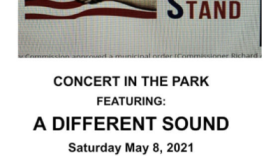The Paducah Symphony Orchestra performs at the Carson Center once again this Saturday night. WKMS classical producer George Eldred speaks with conductor Raffaele Ponti on Sounds Good about the upcoming concert, Pictures at an Exhibition.
Khachaturian is one of those composers that often surprises me, Ponti says. His music is timeless. When you listen to it, it feels like a film score. Spartacus is a wonderful ballet, not often performed anymore, and Suite No. 2 is a collection of some of the finest moments in the ballet. He’s not an obscure composer, but it’s a piece many haven’t heard, but they’ll definitely identify with and recognize some of the melodies.
Haydn’s Symphony No 45 – The Farewell Symphony
This one has a great story to it. Ponti says that out of 104 symphonies, this is why they call him Papa Haydn. He made a niche for himself. In his time with Prince Esterházy as a court composer – he was off the beaten path and didn’t get the chance to hear a lot of other composers during this period. Haydn said this forced him to become more creative on his own.
The Farewell Symphony has a particularly unusual form because he ends it with a slow movement, which is almost unheard of – especially for this time period. Ponti tells the story like this: The musicians had been in a long period of concertizing and were coming up to a vacation. But the prince wanted a soiree so they had to stay one extra day to perform. They were all upset. So Haydn literally writes places where the instrumentation stops in the score.
So the bassoonist is playing and all of sudden there’s a double bar finish in the middle of a phrase. And the bassoonist gets up and walks off stage and out of the palace. And he does that with the horns, each stand of the string section little by little, so it’s very subtle. Musicians gradually leaving the stage, sneaking out the back door to begin their vacation early. Ponti guesses there may have been a reprimand for this at some point, but he gave the musicians the vacation they wanted right there in the score.
Pictures at an Exhibition
Probably one of the most recorded pieces of all time, Ponti says. The Symphony is doing the Ravel orchestration. Mussorgsky never orchestrated this piece. It was written for piano – which shows that he must have been an incredible pianist himself.
Ponti sets the scene: Mussorgsky’s dear friend, Viktor Hartmann, who was an artist, passed away. Mussorgsky went to the exhibition to see his works as a tribute. The piece is almost a life experience - beginning with a promenade which is literally Mussorgsky walking though looking at each work, but it has an odd meter/gait. He puts it in 5/4, 6/4, 5/4, 6/4, 5/4, 3/4, 5/4 and on and on. It replicates him walking and stopping and looking and being drawn to specific works.
Ponti believes that Ravel’s orchestration is one of the most powerful and exciting, but he also enjoys listening to the around 10 other orchestrations of the work to see where they put in the colors. The difficulty of this piece for musicians is that there’s no form to the piece, Ponti says. It moves from work to work to work, an art piece to an art piece to an art piece. It changes on a dime.
The musician has to capture the essence of what the artwork would have looked and felt like portrayed with the color and texture of their performance. For example, Ponti says: The grandeur of the artwork of The Great Gate of Kiev - the size, the magnitude, the strength of that image has to be felt in the last movement of the piece.
Mussorgsky is paying tribute to his friend and giving us the experience of looking at the works, but Ponti says he is also telling us who his friend was through the music. As the audience listens at the Symphony this Saturday, Ponti will try not just to give them the pictures in the music, but also the intensity of how it makes them feel.






